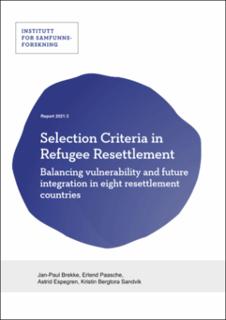Selection Criteria in Refugee Resettlement. Balancing vulnerability and future integration in eight resettlement countries
Research report
Published version
Permanent lenke
https://hdl.handle.net/11250/2758744Utgivelsesdato
2021Metadata
Vis full innførselSamlinger
- Publikasjoner fra CRIStin [716]
- Rapport/Avhandling ISF [367]
Sammendrag
In this report, we analyze resettlement programs for refugees in eight countries, highlighting the similarities and differences regarding their selection criteria and practices. In addition to Norway, the study includes Australia, the United Kingdom (UK), Canada, France, Germany, Sweden, and the Netherlands. Based on more than 50 in-depth interviews with Norwegian civil servants, non-governmental organization (NGO) representatives, UNHCR staff, and governmental representatives from the countries included in the comparative analysis—along with document studies and an international ad-hoc query—we find that all countries wrestle with balancing principles and pragmatism in their selection practices. That is, although they aim to select those refugees who are most vulnerable, they are also taking into consideration the refugees’ future integration or, at least, ability to cope in the host society. We conclude the report by providing a number of policy recommendations for consideration by Norwegian authorities, based on the data presented in this study and on a review of guidelines and practices in the other seven case countries.
